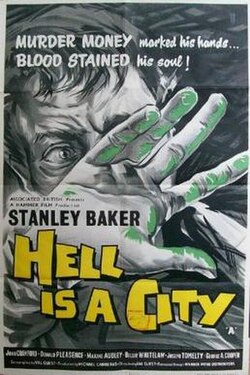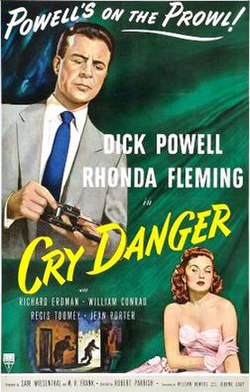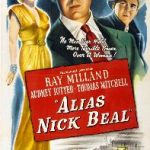
Film Noir Flashback/Alias Nick Beal
July 19, 2025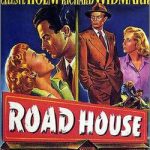
Film Noir Flashback/Road House
February 1, 2026I post reviews (Film Noir Flashback) of movies from, and inspired by, Hollywood’s Golden Age of Noir, the 1940s and 1950s. I am a film noir enthusiast. Maybe, like me, you are looking to enjoy films that are different, or of a different era. Films you may not have seen, ones encompassing cynical detectives, seductive femme fatales, flawed sidekicks all tossed together into intricate plots. Not forgetting the snappy dialogue too.
Backstory: Film Noir has its roots in German expressionist cinematography and American crime fiction. During the 1930s Hollywood became a perfect storm of film artists fleeing the threat of Nazi Germany, emigrating to America, and specifically to the Film studios of Hollywood. This included great directors such as Fritz Lang, Jaques Tourneur, Michael Curtiz and Robert Siodmak.
This new dramatic visual style combined with American hardboiled crime stories (noir fiction), emerged during the Great Depression and produced many classic noirs. Some of these writers include: Raymond Chandler, James M. Cain, Dashiell Hammett, Patricia Highsmith, Jim Thompson and Mickey Spillane.
I hope to showcase some of these memorable noir movies here for you. And advance apologies for a mixture of British and US English occasionally and potential spoilers, although I will always try to avoid revealing the full ending.
Inspired by hardboiled detective stories and film noir, I have written the Sterling Private Investigator Series, set in present-day London. I have also posted a link to some of my books at the bottom of the page. For more of my Film Noir Flashback blogs: https://johnkempauthor.com/blog-film-noir-reviews/
Today’s Film Noir Flashback is:
Hell is a City
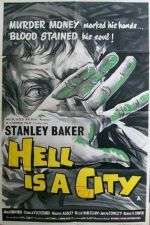
“From dives to dames… From cops to killers… Hell is a city.”
Film Studio: Hammer Film Productions B/W 1960
Distributed by: Warner-Pathe Distributors UK, Columbia Pictures US
Director: Val Guest
Original Music: Stanley Black
Cinematography: Arthur Grant, Len Harris
Film Editor: John Dunsford, James Needs
Story: Hell is a City by Maurice Procter
Screenplay: Val Guest
Main Actors: Stanley Baker, John Crawford, Donald Pleasence, Billie Whitelaw
Produced by: Michael Carreras
Run time: 98/93 minutes
Preview
Courtesy of Wikipedia:
Hell Is a City is a 1960 British crime thriller directed by Val Guest and starring Stanley Baker, John Crawford and Donald Pleasence. It was written by Guest based on the 1954 novel of the same name by Maurice Procter and made by British studio Hammer Film Productions on location in Manchester. It was partly inspired by the British New Wave films and resembles American film noir. Filming ran from Sept. 21, 1959 to Nov. 5, 1959, and the film was trade shown on March 11, 1960 and again on April 10th. This was Stanley Baker’s second and last film for Hammer, because after he appeared in Zulu (1964), Hammer could no longer afford him. This was also Val Guest’s last big movie for Hammer, and he always spoke very highly of the film. An alternate ending was shot for the film featuring Stanley Baker’s reconciliation with Maxine Audley at the end of the movie, but it was apparently not shown theatrically. The alternate ending was included however on at least one DVD release as a bonus feature.
Synopsis
Hell is a City is set in the industrial north of England. The film begins as Manchester city police colleagues, Det. Inspector Harry Martineau (Stanley Baker) and Detective Devery (Geoffrey Frederick) head off to a pub for a drink after their shift. Between their exchanges, we learn that local villain, Don Starling (John Crawford) has recently escaped from prison. Starling was serving a 14-year sentence and whom Martineau helped convict. Likely, the escapee is back in his old (criminal) stomping ground of Manchester because as Martineau says, “there is five thousand pounds worth of jewellery in this town.” Presumably, the loot from a previous sortie…A fair bit of money in those days; about £120,000 in today’s money.
At the Lacy Arms, Martineau is greeted by “Lucky” Lucretia Lusk (Vanda Godsell) who seems to have the hots for the detective. “Well, look who’s here, my gorgeous detective,” she says. Playful or not, Martineau makes light of the attention. Besides, he is a married man albeit in a faltering one. We also learn that lucky (Or should that be “un-lucky” in love? You’ll see…) used to date Don Starling, though when questioned about him, the plain-speaking barmaid says she hasn’t heard from him. “Listen darling,” she says forcefully, “when I’ve finished with someone they’re finished.” You sort of take her at her word too.
We briefly see Doug Savage (excellently played by George Cooper) the landlord of the Lacy Arms on a phone conversation with Laurie Lovett (Charles Morgan) at a Pool & Social club. Talk centres around meeting for the Doncaster races the next day. “8.30. a.m.?” Lovett queries. “We’ll be there before the horses!”
This makes a nice bridge to the next scene because this is where Don Starling shows up, at the same club. Or more specifically, through an upstairs window in the washroom sticking a gun into the back of Laurie Lovett. He orders his former accomplice to arrange for a payroll robbery for the next day. Starling needs a new passport and money to flee overseas. And Lovett needs to find new friends.
The action switches to two young employees directed to bank their employer’s (Gus Hawkins Turf) daily takings. “Get that money off,” says Hawkins (a young Donald Pleasence playing a wealthy bookmaker), “I dont like so much hanging around.” Well, he would say that, he’s off to the races…
The two employees are tailed by the gang, one car blocks the couple’s way in a tight alleyway. Another vehicle enters and blocks their escape to the rear. The attractive young woman Cecily (played by Lois Daine) with the money bag attached to her wrist, is bundled into one car. With a rendezvous for a vehicle switch on the moors, the gang speed off. When the woman starts screaming, she is bludgeoned into silence and subsequently dies. Morbidly, the gang dump her body on the open moors but they are witnessed by a passing motorist…
Martineau investigates; his gut says that Starling is responsible for the robbery and murder. Meanwhile, Starling is looking for a hide-out (and a woman), first calling Lucky who deters him, and then he shows up at Gus Hawkins’s home, and specifically to see his former girlfriend, the promiscuous Chloe Hawkins (Billie Whitelaw). As Hawkins makes moves on Chloe, her husband returns and he hides for the night in the attic. The next morning Gus hears noises from the roof space and investigates. Proceeding up the attic ladder he is clobbered and falls to the ground, surviving but taken to hospital. Chloe is at first silent but then comes clean after being “squeezed” by Det. Inspector Martineau.
One by one, the gang members are picked up and questioned. The green chemical dye applied to the pre-stolen banknotes has left traces on hands, in turn, providing incriminating evidence. There are numerous interesting sub-plots, Martineau’s nearly romantic encounters with Lucky and coin tossing, an illegal game of gambling locals gathered to play on wasteland and featuring members of the gang involved in the robbery. (And their lookouts with binoculars for any sign of the police).
Starling returns to his stolen jewellery cache (hidden in the attic brickwork of a former fence’s house). The innocent daughter, Silver (Sarah Branch) who is Deaf stumbles across the intruder and is able to attract attention by throwing furniture through the windows. With the police tipped off, Martineau goes after his man. The film climaxes in a thrilling, rooftop fist-fight finale.
Things to like
The Lacy Arms Public House. The pub is dripping with Mancunian atmosphere, where you’ll find a friendly barmaid, the beer-drinking regulars and back and forth banter. Who wouldn’t want to have a pint there? The opening camera shot, panning back to its open doors, (with the landlord in the foreground) almost invites the detectives (and in turn, the viewer) inside. A great introduction to the many disparate characters supping their beer within.
Martineau’s relationships. There’s his partner, Detective Devery who seems straight as an arrow. Young, loyal and supportive. He’s never far away, popping up when his boss most needs help.
Lucky, the sassy barmaid. The two have great on-screen chemistry together with rat-a-tat dialogue that involves plenty of innuendo and flirty exchanges. They seem like a good match but Martineau is ultimately faithful to his wife. Though, throughout, we are never quite sure if he will succumb to her charms or not.
Martineau’s marriage to Julia Martineau (Maxine Audley) is on the rocks due to the long hours spent on cases such as this one, and his desire to have children (in contrast to his wife). This provides the ammunition for his domestic conflict making his character authentic and three dimensional.
Finally, Don Starling – who Martineau seems to be obsessed with – and with whom he went to school together. Starling has chosen a life of crime, while Martineau chose the police. When Martineau’s superior says, “we don’t even know if he (Starling) is within 100 miles of Manchester,” Martineau fires back, “I know… I know how his mind works, I grew up with the man, went to the same school, fought the same war together, I know how his mind works.” You know it’s personal.
Martineau’s gag. Martineau directs a facetious enquiry to the on-duty copper outside of Chloe Hawkins’s house. Asking him, if he is married… Adding a tongue in cheek “watch out” warning to his colleague before he leaves.
The line about birds being in the attic. “A Starling in the Attic perhaps?” Hawkins queries. Cue the detectives exchanging incredulous looks.
Quotes
Det. Inspector Harry Martineau: (at the bar)“A policeman on a date…”
Lucky (Lucretia Lusk): “Well, it’s nice to know some of you are human.”
Det. Inspector Harry Martineau: “Some of us are even married… Take care of yourself, Lucky.”
Lucky: “I could take care of you if you’d let me.”
***
Det. Inspector Harry Martineau: “There’s still five thousand pounds worth of jewellery in this town; he might come back for that.”
Det. Devery: “Or take a pot-shot at you.”
Det. Inspector Harry Martineau: “That’s crime book stuff. A man doesn’t break out of jail to kill a cop, he breaks out to get away…”
Det. Devery: “That’s not what he swore at his trial.”
***
Det. Inspector Martineau: (talking about banking deposits and crimes)“They send out old men with factory payrolls, office boys with a handful of fivers and young girls with money chained to their wrists. You can see it on any day in any town. They’re asking for murder.”
Must-see scene
The rooftop chase is full of gritty realism and makes for an exciting denouement. Nevertheless, I’ll plump for the following scene with the talented Billie Whitelaw.
Fresh from a night out, a lover drops Chloe Hawkins home. Once inside, she first notices a smoking cigarette balanced on the edge of an ashtray. Then, Don Starling. A blast from her past. He might be an old flame but she is spooked by his presence. “Do you want money,” she asks. “I’ve been in a monastery for five years,” he pleads, “I want you,’ he says.
Suddenly, the doorbell rings. It’s Devery (making his enquiries). Panic stations. When the detective gives up, Starling goes back to his lovemaking. Then we hear her husband’s voice speaking to the detective outside the door. Again, this chilling, almost farce-like romp continues. Finally, Starling pulls down a a ladder and hides in the attic promising to return for her in the morning.
Locations
Summary
Hammer Films were renowned for their horror movies of course, but they also made a number of films that were noir-like, including this later project from 1960.
A British crime drama, no doubt inspired by the great American noir films. This is an unsentimental slice of life that packs a heavy noir punch.
Director Val Guest executes the pacing brilliantly. Filmed on location, he makes great use of the Manchester settings, even featuring dramatic action on the Moors. The dramatic photography uses framed character close-ups, the dark alleys and streets of Manchester, and sweeping shots of the open countryside which ooze noir style.
Stanley Baker convinces as a no-nonsense hard-boiled cop who obsessively pursues gang leader Don Starling. He’s tough but honest with problems of his own. Baker makes the film compelling (and human), and is ably backed up by John Crawford, Billie Whitelaw, George Cooper and Vanda Godsell.
The dialogue too, is both real and witty. With its jazz score, brassy barmaids, wealthy socialites, a psychotic killer and a hard-boiled cop, you have all the necessary noir ingredients. Add in a few felons and provocative wives and you have a noir hot pot. This Brit noir deserves to be seen and to be appreciated more. I would highly recommend you check it out.
For more of my Film Noir Flashback blogs: https://johnkempauthor.com/blog-film-noir-reviews/
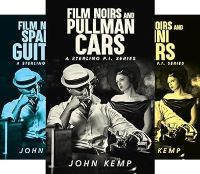
“An interesting detective story, with dry as a bone dialogue, that ticks all the film noir boxes. A great fun read.” ~ Film Noirs and Doused Cigars.
USA Link: Film Noirs & Doused Cigars– Audio: https://tinyurl.com/ythp5nsy eBook: https://tinyurl.com/fprdmsvb Paperback: https://tinyurl.com/2d7aeynd
UK Link: Film Noirs & Doused Cigars – eBook: https://tinyurl.com/4d84n4wx Paperback: https://tinyurl.com/bd2y4yra

